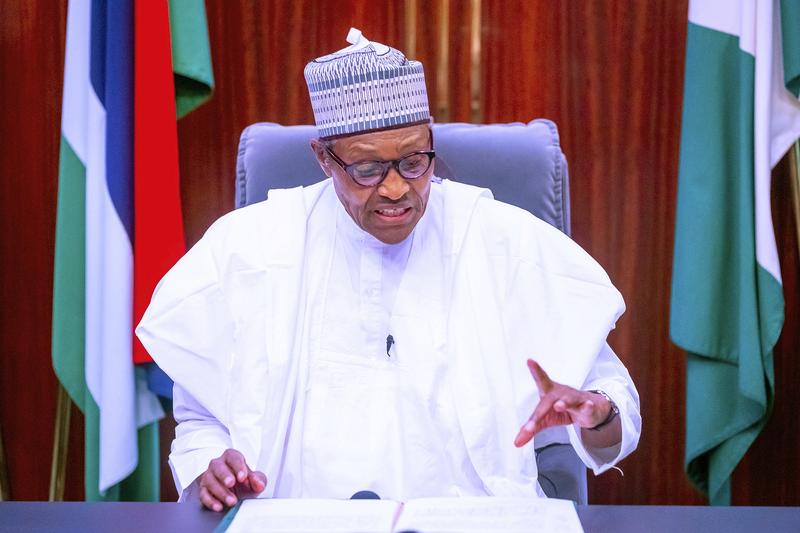 In this photo released by the Nigeria State House, Nigeria's President Muhammadu Buhari, addresses the nation on a live televised broadcast, Oct 22, 2020. (BAYO OMOBORIOWO / NIGERIA STATE HOUSE VIA AP)
In this photo released by the Nigeria State House, Nigeria's President Muhammadu Buhari, addresses the nation on a live televised broadcast, Oct 22, 2020. (BAYO OMOBORIOWO / NIGERIA STATE HOUSE VIA AP)
Nigerian President Muhammadu Buhari called for an end to mass protests against police brutality in which dozens of people have died, as he warned the authorities will act to protect lives and property.
The protests that erupted in Africa's biggest economy on Oct 5 have spread to about half of Nigeria's 36 states, posing the most serious challenge yet to Nigerian President Muhammadu Buhari's authority. They've also dealt another blow to an economy that was already reeling from the coronavirus pandemic
Addressing the nation on state television, Buhari said protesters should "resist the temptation of being used by some subversive elements to cause chaos" and undermine democracy. "For you to do otherwise will amount to undermining national security. Under no circumstances will this be tolerated."
It was the first time Buhari has addressed protesters directly, one of their key demands since the rallies began two weeks ago. He's largely remained silent through the growing crisis, mainly using aides and statements to deliver his response to calls for reforms.
ALSO READ: Protesters return to Nigeria's streets after deadly clashes
The protests that erupted in Africa's biggest economy on Oct 5 have spread to about half of Nigeria's 36 states, posing the most serious challenge yet to Buhari's authority. They've also dealt another blow to an economy that was already reeling from the coronavirus pandemic.
Weaker currency
The unrest and the authorities' increasingly heavy-handed response has begun to unnerve financial markets, with the naira dropping as much as 1.2 percent against the dollar on Thursday.
The risk premium that investors demand to hold Nigeria's dollar debt rather than US Treasuries has widened 20 basis points this week, while the average for African nations narrowed two basis points, according to JPMorgan Chase & Co indexes.
The streets of Lagos and Abuja, the capital, were largely devoid of protesters on Thursday, and demonstrations in the southern oil-producing Rivers and Delta states that erupted on Wednesday have also died down. At least 10 states have imposed curfews.
Most of the demonstrators are young adults who don't appear to have a clearly defined leadership structure and communicate using social media, which the government says has frustrated efforts to negotiate with them.
The largely peaceful demonstrations persisted even after Buhari promised to disband a police unit at the center of the brutality allegations. He reiterated the government's commitment to further police reforms on Thursday, as he also highlighted government youth-development programs.
READ MORE: Governor: Nigerian military offered to deploy in Lagos if needed
Buhari's speech will do little to appease the protesters and demonstrations are likely to continue once curfews are lifted, said Cheta Nwanze, an analyst at Lagos-based SBM Intelligence.
"The president's speech was essentially a middle finger to Nigerians," he said. "In saying nothing of note, and refusing to show any empathy for the plight of the people he purports to govern, he has alienated a generation that is really motivated by high youth unemployment and a sharply rising cost of living."


